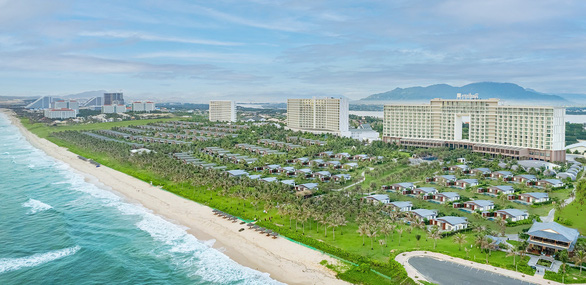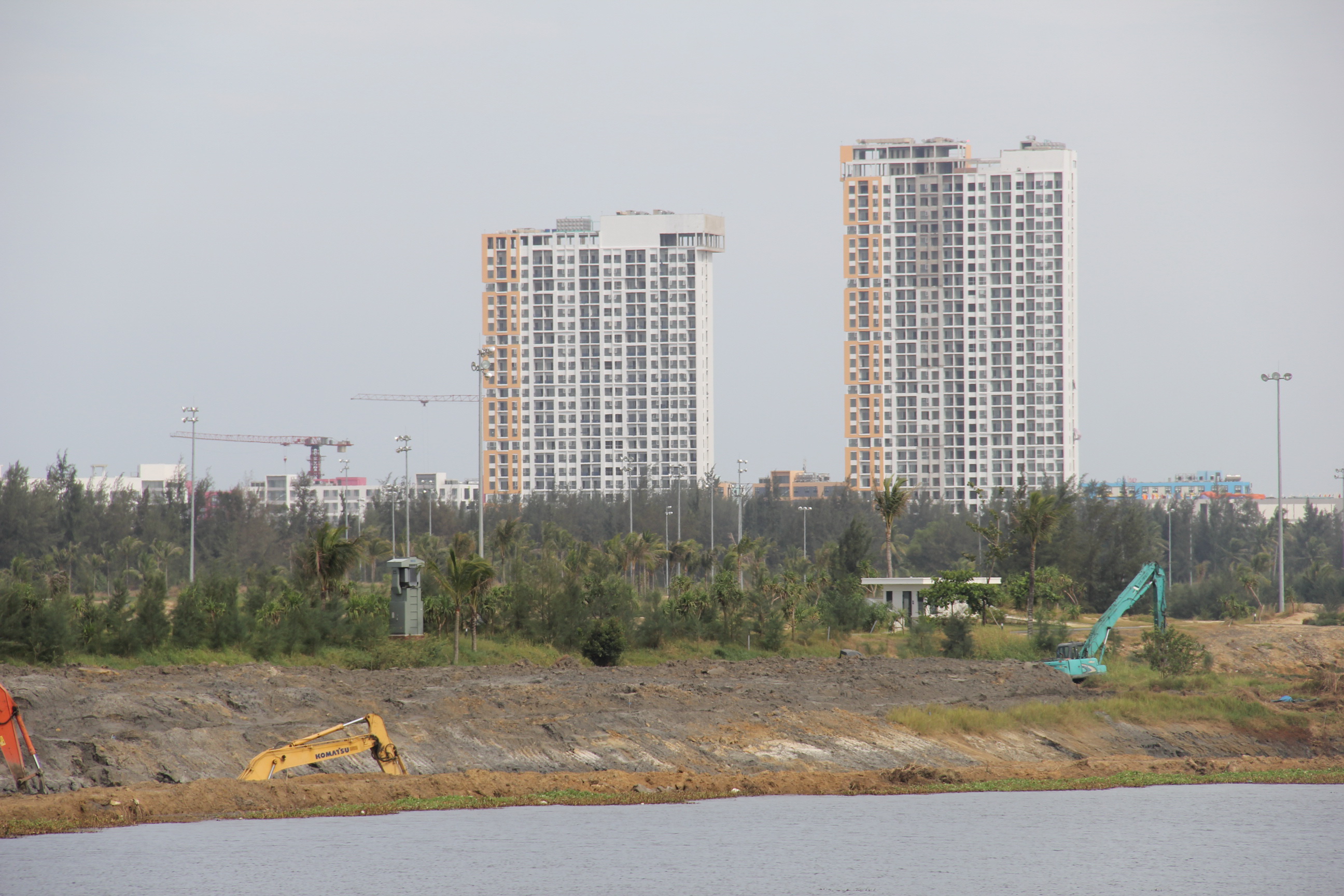Project developers and property brokers across Vietnam are claiming the country’s tourism real estate market is troubled by about US$30 billion in 'frozen' assets at 239 projects in 15 cities and provinces due to the lack of a legal framework regarding the ownership of studios, resort rooms, and shophouses.
In Vietnam, buyers are only permitted to purchase such properties under 50-year-ownership agreements, or longer in some special cases.
Experts and administrators believe that clearer laws regarding the fate of these developments after the lease expires will be a significant contribution to the country’s economic recovery, particularly in terms of growth within the tourism sector.
Tens of billions of U.S. dollars in property with no buyers in sight
Hundreds of vacation real estate project developers in several provinces and cities with huge tourism potential including Quang Ninh, Thanh Hoa, Da Nang, Binh Dinh, Khanh Hoa, Ninh Thuan, Binh Thuan, and Kien Giang are unable to attract buyers or investors owing to their inability to issue ownership certificates.
That has resulted in hundreds of condotel, shophouse, and villa projects left on the market with no potential buyers.
Vietnam had 239 resort properties, including 114,097 condotels and 24,399 villas, valued at some VND694 trillion ($30 billion) as of September 2021, according to the Vietnam National Real Estate Association. Of the total value, condotels account for over VND296 trillion ($12.8 billion), shophouses some VND155 trillion ($6.7 billion), and villas nearly VND243 trillion ($10.5 billion).
Dr. Can Van Luc, chief economist at state-owned lender BIDV and a member of the National Fiscal and Monetary Policy Advisory Council, said that resort real estate has only experienced a massive increase in development over the past five years, but already represents some 21.3 percent of the country’s three- to five-star hotel rooms.
Comparatively, the supply of vacation homes remains modest, meeting a mere one-fourth of customer demand.
Nguyen Van Dinh, chairman of the Vietnam Association of Realtors, stressed that the undersupply of resort real estate products has weakened the competitiveness of the tourism sector, lagging far behind many countries in the region such as Thailand, Singapore, and Malaysia.
According to Dinh, a host of policy-related obstacles are hampering the development of the tourism property field.
Khanh Hoa Province has over 40 vacation property projects worth a combined VND30 trillion ($1.3 billion). Many of these projects have been completed and put into service and the developers have fulfilled financial obligations.
“They have fire prevention and fighting systems that meet regulations. The problem is that only a few have ownership certificates. This is a major turn-off to potential buyers,” Dinh said.
According to Professor Dang Hung Vo, former Deputy Minister of Natural Resources and Environment, there is little regulation governing resort real estate.
Many hoped this would change once the government announced the reopening of tourism activities following COVID-19, particularly given that tourism was meant to spearhead the country’s post-pandemic economic recovery, but that has not been the case.
Getting the market moving
To 'unfreeze' the tens of billions of dollars locked up in unsold vacation properties, Dr. Luc suggested changing mindsets, introducing policies on the development of resort property, and transforming the industry so that it meets the needs of residents and tourists.
Luc also stressed that it is vital to create legislation for new types of real estate, such as making policies that state 'residential land does not form residential units' – an idea which would specifically classify vacation property and allow for the issuance of property ownership certificates.
This solution will partially help move the hundreds of billions of Vietnamese dong currently tied up in resort property projects and stimulate investment, according to Luc.
Echoing Luc’s view, Dr. Nguyen Van Quyen, chairman of the Vietnam Bar Association, said that establishing a stable and adequate legal framework for the vacation real estate is urgently needed amid the post-pandemic recovery of tourism.
As for vacation property projects which have already been completed and put to use, the property should be reclassified as 'residential' in order to allow for the issuance of ownership certificates, Quyen added.
Prof. Dr. Tran Viet Dung, head of the international law faculty at the Ho Chi Minh City University of Law, affirmed that the lack of clear legal guidelines is hampering the development of vacation real estate in Vietnam.
|
|
| The owner of The Empire, or Cocobay, project in Ngu Hanh Son District, Da Nang City seeks to convert a part into an apartment building. Photo: Truong Trung / Tuoi Tre |
Many vacation property project developers have yet to receive ownership certificates because relevant agencies dare not grant them to individual owners due to unclear mechanisms and policies.
But not all experts agree.
Issuing permanent ownership certificates for resorts and villas is a way to serve business rather than social activities. This will cause corollaries, including failing to guarantee essential social infrastructure and blighting urban and residential areas, said architect Nguyen Van Loc, former director of the Khanh Hoa Department of Construction
“As such, I hope the leaders of the Party, the National Assembly, and the government take account of all issues and consequences from the planned modification of the land law to avoid the legalization of practices that could hurt the society and people,” Loc said.
How ownership certificates work in Vietnam
Prevailing regulations stipulate the duration of land use based on the shelf life of projects, despite the fact that vacation property sellers and buyers expect to receive long-term ownership certificates.
This results in tens of billions of dollars’ worth of real estate that no one wants to buy.
Pham Thi Thinh, deputy head of the Land Registration Bureau under the General Department of Land Administration, said that vacation real estate ownership certificates are comprised of two parts – land use rights and asset ownership.
Using a shophouse purchased from a vacation property project as an example, Thinh explained that granting an ownership certificate for the unit must follow the laws on investment and real estate business. As the land of the shophouse is leased land with a one-off payment, investors are allowed to sell the land use rights and the land-attached building. This case covers both.
Pursuant to Article 175 of the Land Law, if investors rent land with annual payments, they can sell the land-attached assets but will not be permitted to transfer the land use rights.
Thinh added that a vacation property project alone can be built on several types of land so ownership certificate issuance will denote if the land is meant for service, education, sports, or healthcare.
According to Hoang Thi Van Anh, head of the Legal Department under the General Department of Land Administration, owners of condotels, shophouses, officetels, vacation homes, and villas, among other properties meant for lodging and tourism will be granted ownership certificates if they meet all requirements of the Laws on Construction and Real Estate Business.
After getting a certificate, owners can transfer these properties, similarly to what can be done with other types of housing projects, Anh noted.
Prof. Dr. Hoang Van Cuong, deputy dean of the National Economics University in Hanoi, stated that vacation real estate projects built on commercial land normally receive a 50-year ownership certificate.
After 50 years, if assets remain on the land, local governments will extend the ownership period.
The Ministry of Natural Resources and Environment is in the process of drafting a decree which ammends and supplements certain decrees guiding the execution of the Land Law for the issuance of ownership certificates for tourism properties developed on commercial land.
Buyers of tourism properties expect to gain the ownership for a long-term period, while specific regulations on ownership are yet to be issued.
Most vacation real estate projects are aimed at serving business and tourism activities rather than serving as places of residence, according to Deputy Minister of Construction Nguyen Van Sinh.
In the initial stage, the issuance of ownership certificates for tourism properties still depends on the time of land handover rather than types of land.
Despite boasting assets worth tens of billions of dollars, the vacation real estate segment is 'hibernating' due to the shortage of a legal framework.
Like us on Facebook or follow us on Twitter to get the latest news about Vietnam!















































